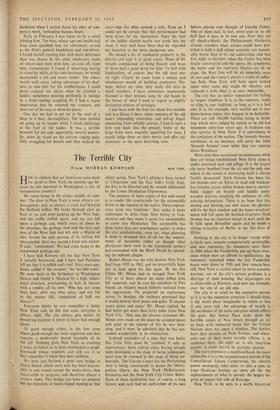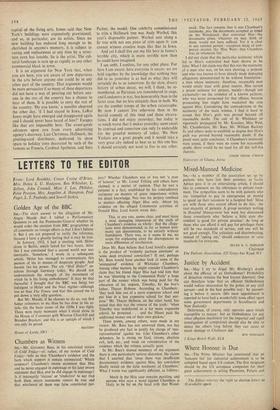The Terrible City
From MURRAY KEMPTON NEW YORK How to explain that an American came back for good to New York six months ago be- cause he felt deprived in Washington, a city of comparative amenity?
We came home in the airless middle of sum- mer. The door to New York is most often. a rat- passageway; and, as always, a truck had blocked the Holland tanel. We broke through after an hour or so, and went gasping up the West Side, and the traffic stalled again, and my eye fell Upon a garbage can, which years of abuse by the elements, the garbage men and the very sad- ness of the West Side had left only a filigree of rust. Across the only portion of its surface left uncrumpled, there was pasted a fresh new sticker. It said : `CONDEMNED.' We had come home to the condemned garbage can.
I have had Romans tell me that New York is socially backward, and I have had Parisians tell me that it is selfish and cruel. Sixty years ago, James called it 'the monster,' the 'terrible town.' He went back to his birthplace in Washington Square and found it 'blocked by a high, imper- sonal structure, proclaiming its lack of interest With a crudity all its own.' Who has not come back here, after any time away, and not felt as the master felt, 'amputated of half my history'?
Everyone thinks he can remember a better New York and, in this one case, everyone is always right. The city always gets worse; its devouring purpose is never to leave bad enough alone.
Or good enough either, in the few cases Where good enough has been neglected and thus remains a moderately decent facsimile of its old self. Nothing gives New York so crushing a sense of failure as to have overlooked a neigh- bourhood whose residents can still see it as they remember it when they were children.
We have just finished a great new bridge to Staten Island, which until now has been inacces- sible to any transit except the motor-ferry, thus inaccessible to progress, and therefore almost a country town. This bridge can have no purpose but the ruination of Staten Island; having set that object going, New York's planners have turned to Chinatown and the East Side's Little Italy, the first to be bisected and the second obliterated by the Lower Manhattan Expressway.
The purpose of these orgies of fire and sword is to render life comfortable for the automobile driver at the expense of the native. These express- ways serve two functions: they make it more convenient to drive from New Jersey to Con- necticut and they make it easier for automobiles to come into Manhattan. The automobile has done more than any non-human agency to make the city uninhabitable; even yet, what planning is done is designed first of all for the require- ments of motorists, rather as though what physicians there were in the fourteenth century had contended with the Black Death by spread- ing the bubonic plague.
Robert Moses was the only planner New York had from 1933 to 1962, and we prayerfully hope not to look upon his like again. By the late Fifties Mr. Moses had so ravaged New York City as to have almost no more urban area left ungutted, and he cast his attention to Fire Island, an Atlantic beach hitherto isolated from his aggressions. He projected an expressway across its beaches; the residents protested that it would destroy their peace and quiet. `If anyone wants peace and quiet,' Mr. Moses replied, 'he had better get more than forty miles from New York City.' That was the clearest statement Mr. Moses ever made on the place he assigned peace and quiet in the scheme of life he was plan- ning; and it must be admitted that he has suc- ceeded wonderfully in its elimination.
Isolated reminders of a time that was better like Little Italy must be 'renewed' if only as expressways; more central areas, having 4 already been developed to the stage of being unpleasant, must now be renewed to the stage of being un- bearable. The Lincoln Center for the Performing Arts is being constructed to house the Metro- politan Opera, the New York Philharmonic Orchestra and the New York City Center Ballet. Each of these institutions has, of course, a long history and each had an auditorium of its own
before anyone ever thought of Lincoln Center. One of them had, in fact, more seats in its old hall than it does in its new one. Now they are all chock-a-block; the Philharmonic Orchestra already wonders what science could have pro- vided it with a hall whose acoustics are lament- ably worse than in its old auditorium; and that first night in October, when the Center has been finally constructed and the opera, the symphony, the ballet and the repertory theatre are all on stage, the West Side will be an immobile mass of cars and the Center's piazza a crush of suffer- ing flesh. New York will have again looked upon what some day might be obsolete and replaced it with what is at once impossible.
The city has an unfair reputation for failing to respect tradition. It is, to the contrary, ready to cling to any tradition, so long as it is a bad one. It is, for example, very careful not to tear dowt . houses unless they happen to be habitable. There are still 342,000 families living in build- ings which were judged by statute to be old law tenements sixty-four years ago. A tradition can also survive in New York if it contributes to the confusion of the natives. The Seventh Avenue autobuscs, as an instance, still carry the label 'Seventh Avenue' even while they are running down Broadway.
Most cities bear occasional inconvenience while they are being rehabilitated; New York alone is under continual sack and pillage. It is the largest city never bombed from the air and the only one which in the round of destroying itself is always freshly devastated. Sixth Avenue has been for ten months now an Ypres of mud and window- less temples, across which broken men in chester- fields stagger on boards and huddle under wooden lean-tos coughing the sediment of still- echoing detonations. There is no hope that this mining and blasting can ever cease; the glaziers will fix the final window and the house-wreckers' union will fall upon the finished structure; Sixth Avenue has no function except to wait until the fit falls upon Rossellini again and he needs a setting evocative of Berlin in the last days of Hitler.
Nothing in the city is in danger except what is fairly new, remains comparatively serviceable, and was expensive. Its tenements were there in 1886 when the Vanderbilts put up those man- sions which were an affront to egalitarians; the tenements remained when the last Vanderbilt house went down in 1926 and they remain here still. New York is careful about its more noisome warrens; one of the city's serious problems is a shortage of slum housing. But skyscrapers are as disposable as Kleenex; each new one triumphs over the site of an old one.
The city is as cruel to the expensive person as it is to the expensive structure. I should think it the Worst place imaginable in which to live if you were rich. An advantage of wealth is the avoidance of the noise and press which afflicts the poor. But Sutton Place looks upon the horrible canals of New Jersey through an air so hazy with industrial waste that the United Nations dare not open a window. The Soviets have their mission on Park Avenue: and when- ever one of their more notable villains is in residence there, the night air in this luxurious quarter is made horrid by patriotic pickets.
The more expensive a neighbourhood, the more vulnerable it is to the reconnaissance patrols of the Consolidated Edison Corporation, the electric power monopoly, who seem, to take a case, to keep Madison Avenue an open pit for the replenishment of what is already the largest de- posit of copper this side of Katanga.
New York, to be sure, is a vastly important capital of the living arts. James said that New York's buildings were expensively provisional; and so, in particular, are its artists. Since no new building has endured long enough to be cherished in anyone's memory, it is subject to razing and replacement at any time by a struc- ture even less lovable. So is the artist. The cul- tural landscape is torn up as rapidly as any other commercial block in town.
It is an argument for New York that, when you are here, you are aware of new departures. in the arts before anyone else could be in any other part of the country. That argument would be more persuasive if so many of these departures did not have a way of petering out before any- one in the rest of the country has a chance to hear of them. It is possible to envy the rest of the country. 'Do you know,' a novelist observed the other day, 'if I had stayed in Iowa, LeRoi Jones might have emerged and disappeared again and I should never have heard of him?' Escapes like that are impossible here. The avant-garde advances upon you from every advertising agency's doorway. Last Christmas, Hallmark, the greeting-card distributor, dedicated its show space to holiday trees decorated by such of the famous as Francis, Cardinal Spellman, and Suzy Parker, the model. One celebrity commissioned to trim a Hallmark tree was Andy Warhol, this year's disposable painter. Warhol sent along a fir tree with not one piece of trim upon it; you cannot witness creative leaps like that in Iowa.
And yet I shall live out my life here in James's terrible city, which is more terrible now than he could have imagined.
I am unfit, I confess, for any other place. For here I am aware; here everyone is aware; we are held together by the knowledge that nothing they did to us yesterday is as bad as what ,they will certainly do to us tomorrow. In the slow, dreary history of urban decay, we will, I think, be re- membered, as Parisians are remembered in siege, and Londoners in war, less honourably than in the latter case, but no less uniquely than in both. We are the combat troops of the urban catastrophe. By now I cannot live otherwise than in the horrid comedy of this mud and those excava- tions. I did not enjoy yesterday; but today is so much worse that it makes yesterday seem sweet by contrast and tomorrow can only he endurable for the grateful memory of today. We New Yorkers are a great people and it would take a very great city indeed to beat us as this one has. I should certainly not want to live in any other.


































 Previous page
Previous page